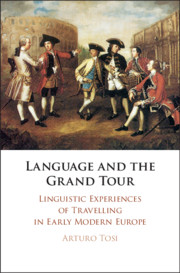Book contents
- Language and the Grand Tour
- Language and the Grand Tour
- Copyright page
- Dedication
- Dedication
- Contents
- Figures
- Preface
- Acknowledgements
- Chronology
- Introduction
- Part I Attitudes and Aptitudes
- Part II Encounters and Exchanges
- 4 Language Acquisition and Learning Abroad
- 5 Aids, Strategies and Facilitators
- 6 Latin and Other Lingua Francas
- Part III Contrasts and Collisions
- References
- Index of Names
- Subject Index
4 - Language Acquisition and Learning Abroad
from Part II - Encounters and Exchanges
Published online by Cambridge University Press: 23 March 2020
- Language and the Grand Tour
- Language and the Grand Tour
- Copyright page
- Dedication
- Dedication
- Contents
- Figures
- Preface
- Acknowledgements
- Chronology
- Introduction
- Part I Attitudes and Aptitudes
- Part II Encounters and Exchanges
- 4 Language Acquisition and Learning Abroad
- 5 Aids, Strategies and Facilitators
- 6 Latin and Other Lingua Francas
- Part III Contrasts and Collisions
- References
- Index of Names
- Subject Index
Summary
What we constantly read in travel accounts of solo travellers is that they made a point of mingling with local people, wherever they were, and invariably boasted about their progress in the language they spoke with the locals. If the travellers were accompanied by a governor, he himself taught the local language or hired additional tutors to instruct the boys in languages, academic subjects, arts and social skills from music to horsemanship. Throughout the era of the Grand Tour the Loire region in France attracted many travellers, acting on the common belief that the ‘best’ French was spoken there, thus making the cities of the valley an ideal place for language learning. Young men were eventually sent to cities of the Loire, rather than to other French cities equally known back home, because of a combination of factors: the pleasant landscapes and favourable climatic conditions; the quietness of these cities compared to the turbulent environment of the capital, and the reputation of the schools with their accredited language teachers. Tuscany in Italy was the equivalent of the Loire Valley in France, and of all its cities, Siena was the one with an international reputation for the purest language.
Keywords
- Type
- Chapter
- Information
- Language and the Grand TourLinguistic Experiences of Travelling in Early Modern Europe, pp. 107 - 137Publisher: Cambridge University PressPrint publication year: 2020

